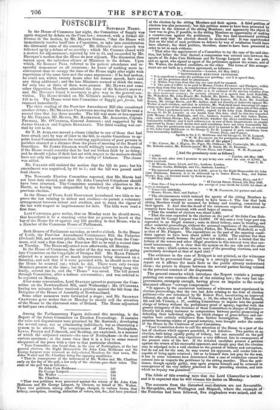POSTSCRIPT.
SATURDAY NIGHT.
In the House of Commons last night, the Committee of Supply was again stopped by debate on the Corn-law ; renewed, with a formal dif- ference in the motion, by Mr. MILNER GI:mow, "that the House will immediately resolve itself into a Committee, to take into consideration the distressed state of the country." Mr. Gibson's clever speech was followed up by a debate of no novelty ; which Mr. COBDEN closed with a motion for adjournment; rejected by 188 to 33, and succeeded by Mr. HINDLEY'S motion that the House do now adjourn. The discussion then turned upon the unbroken silence of Ministers in the debate. Upon which, Sir ROBERT PEEL referred to his patient attendance and re- spectful demeanour on all occasions : he knew of nothing more in- convenient than to occupy the time of the House night after night with repetitions of the same facts and the same arguments : if he had spoken, he could not, within twenty hours after his former speech, have said any thing additional ; and the late Ministers seemed to think the same, for only two or three of them were present. Mr. HAWES and some other Opposition Members admitted the force of Sir Robert's answer ; and Mr. HINDLEY found it necessary to give way to the general con- viction. The House divided on Mr. Gibson's motion ; rejecting it by 156 to 64. The House went into Committee of Supply pro forma, but resumed immediately. The third reading of the Poor-law Amendment Bill also occasioned another debate ; Mr. SHARMAN CRAWFORD moving that the bill be read a second time that day three months. The bill was more or less opposed by Mr. FIELDEN, Mr. MUNTZ, Mr. RASHLEIGH, Mr. AGI1ONBY, Captain PECHELL, Mr. O'CoNNELL, General JOHNSON; and supported by Sir JAMES GRAHAM and Captain BERKELEY. The third reading was car- ried by 103 to 30.
Sir T. D. ACKLAND moved a clause (similar to one of those that had been struck out) by way of rider to the bill, to enable Guardians to ap- point Local Commissioners for receiving applications of poor persons in parishes situated at a distance from the place of meeting of the Board of Guardians. Sir JAMES GRAHAM would willingly consent to the clause, if the House would consider that he had not broken faith by so doing ; and he should rejoice if their last act with respect to the measure should have not only the appearance but the reality of kindness. The clause was added.
Mr. FIELDEN still resisted the motion that the bill do pass ; but his amendment was negatived, by 83 to 5; and the bill was passed amid load cheers.
The Newcastle Election Committee reported, that Mr. Harris had not been duly elected, and that Mr. John Campbell Colquhoun should have been returned. The Committee sustained the objection to Mr. Harris, as having been disqualified by the bribery of his agents at a previous election.
In the House of Peers, Lord Br:Duct:um introduced two bills to im- prove the law relating to debtor and creditor—to permit a voluntary arrangement between debtor and creditor, and to relax the rigour of the law with respect to imprisonment for debt. The bills were read a first time.
Lord CAMPBELL gave notice, that on Monday next he should move, that henceforth it be a standing order that no person be heard at the bar of the House for or against any bill pending in that House, who is a Member of the Commons House of Parliament.


























 Previous page
Previous page